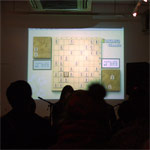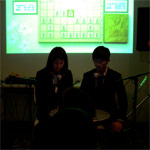コンピュータ同士の将棋対局における棋譜読み上げ Reading Game Records of Japanese Chess Played by Computers
Sitemap
Language
- English
- 日本語
2011年 コンピュータ、自動将棋プログラム、二人の演者(北條知子と共作) 2011, Sound performance (Laptop, Japanese chess computer, two performers) *collaboration with Tomoko Hojo
コンピュータ同士が将棋の対局を行い、その棋譜の読み上げを人間二人が行う。このパフォーマンスは2011年の「AACサウンドパフォーマンス道場特別公演」(名古屋)にて発表が行われた。 Two computers played Japanese chess each other, and two performers read that game records. We performed this at "AAC Sound Performance Dojo Special Stage" (in Nagoya) on 2011.
新しいものを発表するのが当然のアートの文脈で、今ここで、逆に過去の思考をもう一度繰り返す。それは、現代の「何でもアートになり得る」という状況に立ち向かうための一つの術である。はたして、将棋の棋譜読み上げをサウンドパフォーマンスと主張することは、間違っているのだろうか?(公演チラシより) In this time, we repeat the past thinking in the art world context to exhibit new performance obviously. This is one of the available ways to stand up against the "Anything-goes" aspect in the art world. It may be wrong, but we insist that reading game records of Japanese chess is a sound performance. (from performance brochure)
将棋 Shogi (Japanese Chess)
「サウンドパフォーマンス道場」という文脈であえてコンピューター同士の将棋の対局を用いるのは、将棋の対局の形式とサウンド・ライブ・パフォーマンスの形式が一致すると考えたからである。 We daringly perfom "Reading Game Records of Japanese Chess Played by Computers" in the context of "Sound Performance Dojo" by reason that we think that the form of Japanese chess game fits with the concept of one of a sound live performance.
サウンド・ライブ・パフォーマンスは、その場で行われている事象を音響的な側面を重視して観客に伝達するものである。 A sound-live-performance conveys events playing in this place sonically to audiences.
一方将棋は、本来、観客を前提としているパフォーマンスではなく対局する本人同士で完結するものであり、第三者は介入せず、勝負の中で当人同士の思考の世界として自律しようとする形式である。しかしラジオ放送というメディアの誕生以降、そこには観客が存在するようになり、その思考の過程を観客へ音響的に伝達するという目的意識を持つようになった。そこで生まれたのが「棋譜の読み上げ」だ。「棋譜の読み上げ」は、「観客」という存在によって担保された、サウンド・ライブ・パフォーマンスである。 On the other hand, Japanese chess is not a performance for audiences originally, but self-contained game without a disinterested party, and the form which is an autonomous as the two players' domain of reason. However, there were audiences after the medium of radio, and Japanese chess game had sense of purpose to convey the thinking process sonically for audiences. It is for this reason that "Reading game records" was born. "Reading game records" is the sound-live-performance ensured by the "audience."
コンピューター同士の将棋対局 Japanese Chess Played by Two Computers
将棋は「勝負である」ことと、「思考の世界である」ことの二つの側面を持つが、今回、人間同士の対局ではなくあえてコンピューター同士にしたのは、「棋譜の読み上げこそが、(将棋の)思考の世界と観客と音響的な接続点である」ということを端的に表現するためだ。 Japanese chess has two sides, for one thing "this is a game," for another "this is the domain of reason." We set the game played by two computers because we want to represent that "Reading game records is the sonically connection point between the domain of reason and an audience."
人間が実際に舞台上で将棋を指すと、観客は将棋の対戦の勝ち負けに対して感情移入する可能性がある。一方、コンピューター同士の場合、コンピューターは(感情やプライドがないので)「最善手を探る」という目的しかない。今回のパフォーマンスでは将棋の勝ち負けではなく、あくまで接続点のとしての棋譜読み上げが目的であるため、先に述べた側面を強調するためには、コンピューター同士の対局が適切であると考えた。 We think audiences could empathize with the game winning or losing if two human plays Japanese chess. However, there is no affect in computers' game, so we think a game played by two computers is appropriate to represent the above-mentioned concept.
人間 Humans
このパフォーマンスは、今日における「サウンド・ライブ・パフォーマンス」という形式自体を示すし、強調するために行うものである。 This performance represents and emphasizes the form of "sound-live-performance" in this time period.
音楽のデジタル化と個人所有化が急騰している昨今では、「ライブ・パフォーマンス」は逆に、「人間がそこにいる」ということに強い意義を見出せる。つまり、「何度でも再生可能」ということとの相対としての「今まさにここで、人間が音を発している」という事実を、「サウンド・ライブ・パフォーマンス」としている。 In this time of digitalized and privately owned musics, "live performance" conversely have significance in "human existence." In other words, the fact "human beings sound here now" is the relative matter against "replayable as many times as needed," and we define this fact as "sound-live-performance."
そのためにも、「棋譜の読み上げ」というサウンド・ライブ・パフォーマンス自体は、人間によって行われることが適切である。 Therefore, we think it is appropriate that "Reading game records" sound-live-performance should be performed by humans.
(企画書より) (from the proposal)
2011年1月22日(初演)、2011年2月11日(再演「LIVE FANTASISTA!」原宿VACANT)、2011年3月3日(再演「Encadre Presents vol.10」千駄ヶ谷Loop-Line) January 22, 2011 (premiered). February 11, 2011 (restaged in "LIVE FANTASISTA!" at VACANT in Harajuku, Tokyo). March 3, 2011 (restaged in "Encadre Presents vol.10" at Loop-Line in Sendagaya, Tokyo)

